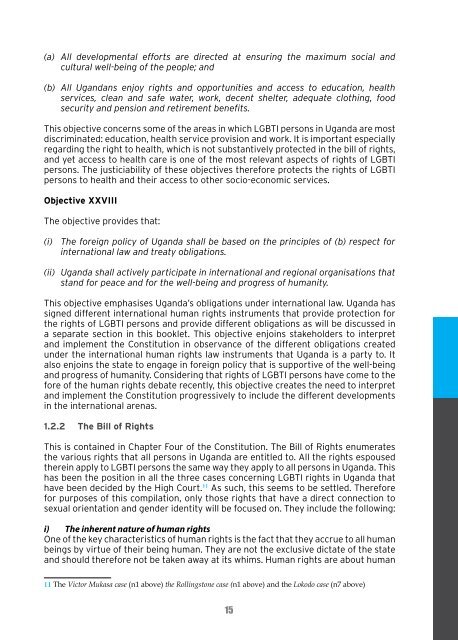PERSONS IN UGANDA
4Tks5WfQb
4Tks5WfQb
You also want an ePaper? Increase the reach of your titles
YUMPU automatically turns print PDFs into web optimized ePapers that Google loves.
(a) All developmental efforts are directed at ensuring the maximum social and<br />
cultural well-being of the people; and<br />
(b) All Ugandans enjoy rights and opportunities and access to education, health<br />
services, clean and safe water, work, decent shelter, adequate clothing, food<br />
security and pension and retirement benefits.<br />
This objective concerns some of the areas in which LGBTI persons in Uganda are most<br />
discriminated: education, health service provision and work. It is important especially<br />
regarding the right to health, which is not substantively protected in the bill of rights,<br />
and yet access to health care is one of the most relevant aspects of rights of LGBTI<br />
persons. The justiciability of these objectives therefore protects the rights of LGBTI<br />
persons to health and their access to other socio-economic services.<br />
Objective XXVIII<br />
The objective provides that:<br />
(i) The foreign policy of Uganda shall be based on the principles of (b) respect for<br />
international law and treaty obligations.<br />
(ii) Uganda shall actively participate in international and regional organisations that<br />
stand for peace and for the well-being and progress of humanity.<br />
This objective emphasises Uganda’s obligations under international law. Uganda has<br />
signed different international human rights instruments that provide protection for<br />
the rights of LGBTI persons and provide different obligations as will be discussed in<br />
a separate section in this booklet. This objective enjoins stakeholders to interpret<br />
and implement the Constitution in observance of the different obligations created<br />
under the international human rights law instruments that Uganda is a party to. It<br />
also enjoins the state to engage in foreign policy that is supportive of the well-being<br />
and progress of humanity. Considering that rights of LGBTI persons have come to the<br />
fore of the human rights debate recently, this objective creates the need to interpret<br />
and implement the Constitution progressively to include the different developments<br />
in the international arenas.<br />
1.2.2 The Bill of Rights<br />
This is contained in Chapter Four of the Constitution. The Bill of Rights enumerates<br />
the various rights that all persons in Uganda are entitled to. All the rights espoused<br />
therein apply to LGBTI persons the same way they apply to all persons in Uganda. This<br />
has been the position in all the three cases concerning LGBTI rights in Uganda that<br />
have been decided by the High Court. 11 As such, this seems to be settled. Therefore<br />
for purposes of this compilation, only those rights that have a direct connection to<br />
sexual orientation and gender identity will be focused on. They include the following:<br />
i) The inherent nature of human rights<br />
One of the key characteristics of human rights is the fact that they accrue to all human<br />
beings by virtue of their being human. They are not the exclusive dictate of the state<br />
and should therefore not be taken away at its whims. Human rights are about human<br />
11 The Victor Mukasa case (n1 above) the Rollingstone case (n1 above) and the Lokodo case (n7 above)<br />
15


